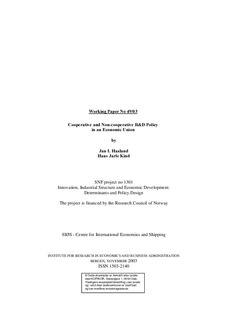| dc.description.abstract | Should R&D policies within an economic union be centralized or decentralized to each individual country? Do non-cooperative policies - typically implying policy competition between countries - always give rise to too high R&D subsidies in a decentralized policy regime? Should small countries subsidize R&D more than larger countries? To address such questions, we construct a simple model with horizontally differentiated consumer goods, where each firm may invest in quality-improving R&D. Assuming that the goods are produced in different countries within an economic union, we compare non-cooperative and cooperative R&D policies. We show that non-cooperative policies imply too small R&D subsidies for horizontally differentiated goods and too high subsidies for goods that are close substitutes. Furthermore, small, net exporting countries of R&D intensive goods have less incentives to subsidize R&D than large countries, resulting in an unwarranted vertical product differentiation between goods produced in different countries. Coordination of R&D policies at the union level helps overcome some of these problems. However, if only a subset of countries cooperate, union welfare may be lower than if there is no R&D cooperation at all. | en |
